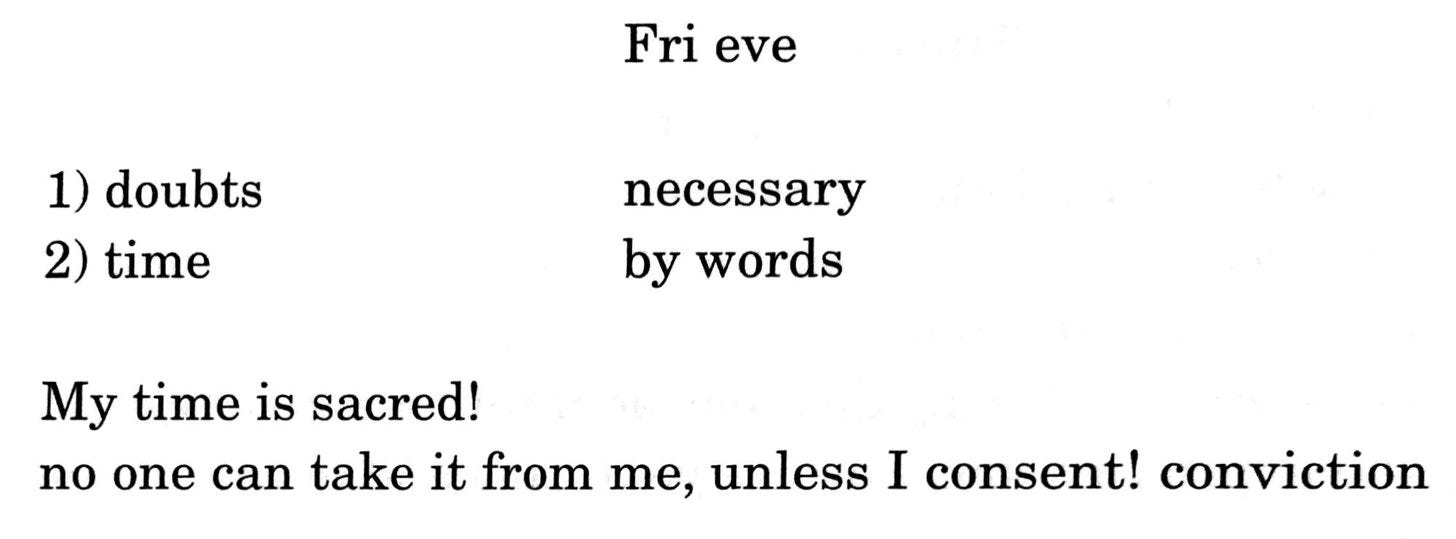routines, rituals, meaning
Routines
Haruki Murakami’s daily routine when he’s writing a novel:
“I get up at 4:00 am and work for five to six hours. In the afternoon, I run for 10km or swim for 1500m (or do both), then I read a bit and listen to some music. I go to bed at 9:00 pm. I keep to this routine every day without variation. The repetition itself becomes the important thing; it’s a form of mesmerism. I mesmerize myself to reach a deeper state of mind. But to hold to such repetition for so long — six months to a year — requires a good amount of mental and physical strength. In that sense, writing a long novel is like survival training. Physical strength is as necessary as artistic sensitivity.
You might already be familiar with Murakami’s routine. After all, writers’ daily habits are a whole genre of internet listicle. I’ll spare you and won’t go on to list Balzac’s 50 cups of coffee or Vonnegut’s pushups (there’s actually a whole Substack focused on this—Subtle Maneuvers).
Still, I’m going to share this screenshot of Robert Lowell’s revision routine because it’s really fucking funny and also this is what I’m currently doing every day at 5 PM: sprawled in bed editing with a cup of milk that may or may not be alcoholic.
Routines can be powerful. As Murakami put it, repetition is a form of mesmerism. However, it’s generally unhealthy to be fixated on other people’s routines because what works for each person is different and if you get too obsessed with the conditions (the right type of desk, the right type of light) you end up using that as a way of avoiding the actual work.
The most helpful thing I’ve ever read on creative discipline is an interview with Arlene Shechet in the New York Times. I’ll quote it here:
What is your day like? How much do you sleep, and what is your work schedule?
I like to get eight hours of sleep. I’m too cranky if I get less than seven. And I am incredibly disciplined with my work schedule. I start in the morning, and I end at night. I’m very good at just committing to the day.
My schedule — it’s anything I have to do to make the work. And I don’t work for a show; I’m making stuff all of the time. I don’t like being too goal oriented, and I don’t believe in having a “body of work,” either. I just believe in art, in showing a generous offering from the studio.
How many hours of creative work do you think you do in a day?
It’s all the time. It doesn’t start and stop. It’s a river or a lake, and I swim in it.
What’s the worst studio you ever had?
I once had a studio in an industrial space that required me to climb up nine flights of stairs. When I got out of graduate school at the Rhode Island School of Design, I didn’t have a studio space for a couple of years, and I started making photographs and printing them on the diazo machine. So I think the room where they kept the diazo machine became like my studio. I feel like if you’re driven, you can figure it out — and I’m definitely driven.
She happens to be married to this uber-cool Buddhist psychotherapist named Mark Epstein whose books I love, and her art is amazing:
The thing I love about the interview is that she’s just so no-nonsense. She commits to the day; she makes art continuously; she believes that you can figure it out as long as you’re driven.
I also believe that being driven and just committing to doing the thing is the most important part. Routines are helpful for getting you in the right mindset: if you know you need to write every day at 6 AM, it’s harder to make excuses to goof off. But at the end of the day if you’re not committed you’re… not committed.
As I was writing this S. pointed out that routines tend to be most powerful for creative work, because in other jobs some kind of structure tends to be forced on you (i.e. if you work at a tech company). However, he said that even within those settings, he finds that the people who most good at what they do tend to have specific and weird routines: they’re obsessive about working out at a certain time of day for instance, or drink a disturbing amount of coffee and don’t eat until 8 PM. This isn’t surprising to me: people who are good at creating systems tend to be good at reaching goals.
My own day: I never start with the main thing I’m working on. Instead I go for a walk and get coffee in the morning, or pick up mail. Then I work on something for Substack. Around PM, I start to actually work, and I keep doing that until I feel like I’m running out of steam. It’s not uncommon for me to wake up in the middle of night to continue working for an hour or two. Then I pass out and do it again. It’s not a super organized process, but hey, it works for me, and as long as something is working well I try not to question it too much.
Rituals
So, what’s the difference between a routine and a ritual? I define routines as casual habitual actions that you repeat day to day. They become rituals when you imbue them with meaning. For example, something like a five mile run every morning can either be something you do quite thoughtlessly to keep yourself in good health, or it can be something sacred that helps you hypnotize yourself into doing the work you need to do.
I quite like this take:

I think of writing as a kind of surfacing: you have what you need inside you already, but you’re learning how to draw it out. All sorts of rituals can help with the release: exercise, writing, watching a movie, illicit substances (er, not that I’m recommending them).
In Victor Turner’s book on liminality The Ritual Process, he makes the point that “the state of being betwixt-and-between is “generative” and “speculative”; the mind that enters it willingly will proliferate new structures, new symbols, new metaphors.”
Also from the Arlene Shechet interview:
There’s a lot of faith and trust involved. It’s like a religious experience. Faith and trust are essential to the making of work. You believe somehow that things will be productive, but you don’t necessarily see or experience productivity on a daily basis. The faith comes from experience. Nobody can teach you faith. You just know — and you also know that there’s a certain amount of failure. I definitely throw out at least a third of what I do. Most of the time, I don’t regret that I made it because I know I had to make that one yucky thing in order to make the other thing.Also from the Shechet interview:
You’re always seeking, but you’re not exactly finding on a strictly defined schedule. Rituals are what you do to catalyze moments of discovery and nurture the magic.

This morning I was thinking about how I have days of creative mania when a problem that’s been bothering me for a month is suddenly magically resolved. On those days everything flows. But I faithfully repeat the same routines and rituals even on weeks when nothing is really happening. Why do I do that?
In the end I guess I believe the Stephen King take:
“Don't wait for the muse. As I've said, he's a hardheaded guy who's not susceptible to a lot of creative fluttering. This isn't the Ouija board or the spirit-world we're talking about here, but just another job like laying pipe or driving long-haul trucks. Your job is to make sure the muse knows where you're going to be every day from nine 'til noon. or seven 'til three. If he does know, I assure you that sooner or later he'll start showing up.”
Your job is to make sure the muse knows where to find you. In other words, consistency makes epiphanies possible. If you’re searching and you’re susceptible, you’ll be ready to receive inspiration when it comes.
To put it another way: consistency is a way of paying attention. By showing up every day, you’re saying, hi, I’m here and I’m listening. I’m here and I’m trying. Carefully directed attention is the best way to solve any problem.
Meaning
My personal ritual is that I constantly take notes on everything interesting I read or hear. For years of my life I barely wrote, just a Tumblr post here or there, a poem I kept to myself. But I was still taking notes all the time. Whenever a friend told me a funny story, I wrote it down. If I was feeling sad over a boy, I wrote it down. When I was mad at myself, I wrote it down. Little notes about San Francisco, quotes from books. I didn’t realize at the time how helpful they’d be, but now I look back and realize that I was paying attention to my own life, and that attentiveness meant something.
I’ve always been scared that my emotions meant nothing. I would fall in love and then it would collapse, and more and more I’ve become someone who’s pretty inward so I wouldn’t tell any friends (or I’d tell them a very censored version), and then after some period of time I would start feeling better, and it would be so sad. Because where did those feelings go? What did they mean and what did I learn? Where does love go when nobody’s there to tend to it anymore, does it evaporate or linger?
I thought it was terrible that I could feel so much and it could seem so significant, so overwhelming, and then it would just eventually dissipate quietly with no visible trace. But now I realize that writing it down gave it meaning. It made every embarrassing thing I’ve ever done something I’m glad for because I can convert it to material. I’ve always loved Henry James’ line, Try to be one of the people on whom nothing is lost! Full context:
The power to guess the unseen from the seen, to trace the implication of things, to judge the whole piece by the pattern, the condition of feeling life, in general, so completely that you are well on your way to knowing any particular corner of it — this cluster of gifts may almost be said to constitute experience, and they occur in country and in town, and in the most differing stages of education. If experience consists of impressions, it may be said that impressions are experience, just as (have we not seen it?) they are the very air we breathe. Therefore, if I should certainly say to a novice, “Write from experience, and experience only,” I should feel that this was a rather tantalizing monition if I were not careful immediately to add, “Try to be one of the people on whom nothing is lost.”
I interpret that as an edict to write it down: to always keep experience close. We live in this ridiculous self-conscious way where we’re always gauging other people’s reactions, like if this person didn’t think it mattered, it must not matter to me either. But that’s not true and it’s harmful and degrading to pretend it’s true. What matters to you matters to you. If you remember that you can begin to create meaning.





Hey, wonderful insights! I just wrote an article on Haruki Murakami's writing routine too. Here's my version of his daily routine
https://thecontentwritingcraft.com/writing-routines/haruki-murakami/
absolutely beautiful, thank you <3